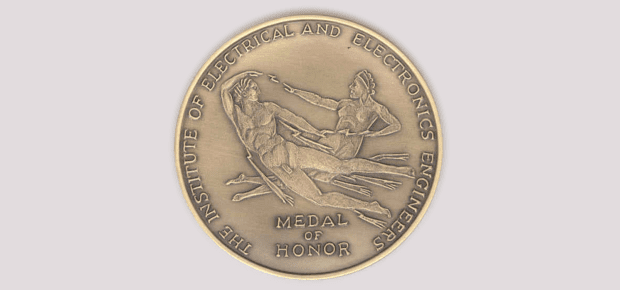April 25, 2017
IEEE has strong roots that date back to 1884, when electricity was becoming a major influence in society. Since then, technology has evolved exponentially, with new inventions and ideas emerging almost daily by trailblazers such as engineers, scientists, allied professionals, computer scientists, software developers, information technologists, physicists, medical doctors, and many others.
Since 1917, IEEE has been honoring trailblazers who have inspired the global community by moving technology and innovations forward.
IEEE honors the best of the best with their highest award, the IEEE Medal of Honor, sponsored by the IEEE Foundation, for an exceptional contribution or an extraordinary career in the fields of science and technology.
This year marks the 100th anniversary of the IEEE Medal of Honor—a tremendous event. Below is a list of some notable recipients from over the years; a complete list can be found at: http://www.ieee.org/about/awards/medals/medalofhonor.html
Edwin H. Armstrong: 1917
“In recognition of his work and publications dealing with the action of the oscillating and non-oscillating audio.”
Louis W. Austin: 1927
“For his pioneer work in the quantitative measurement and correlation of factors involved in radio wave transmission.”
Melville Eastham: 1937
“For his pioneer work in the field of radio measurements, his constructive influence on laboratory practice in communication engineering, and his unfailing support of the aims and ideals of the Institute.”
Lawrence C. F. Horle: 1948
“For his contributions to the radio industry in standardization work, both in peace and war, particularly in the field of electron tubes, and for his guidance of a multiplicity of technical committees into effective action.”
Albert W. Hull: 1958
“For outstanding scientific achievement and pioneering inventions and development in the field of electron tubes.”
Gordon K. Teal: 1968
“For his contributions to single crystal germanium and silicon technology and the single crystal grown junction transistor.”
Robert Noyce: 1978
“For his contributions to the silicon integrated circuit, a cornerstone of modern electronics.”
Calvin Quate: 1988
“For the invention and development of the scanning acoustic microscope.”
Donald O. Pederson: 1998
“For creation of the SPICE Program, universally used for the computer aided design of circuits.”
Gordon E Moore: 2008
“For pioneering technical roles in integrated-circuit processing, and leadership in the development of MOS memory, the microprocessor computer and the semiconductor industry.”
Mildred Dresselhaus: 2015
“For leadership and contributions across many fields of science and engineering.”
David Forney, Jr.: 2016
“For pioneering contributions to the theory of error-correcting codes and the development of reliable high-speed data communications.”
Kees Schouhamer Immink: 2017
“For pioneering contributions to video, audio, and data recording technology, including compact disc, DVD, and Blu-ray.”
The 2017 IEEE Honors Ceremony will be broadcast live on 25 May 2017 at 7:00 p.m. PDT, courtesy of IEEE.tv via IEEE Transmitter.





 Quantum and AI: Safeguards or Threats to Cybersecurity?
Quantum and AI: Safeguards or Threats to Cybersecurity? Why AI Can't Live Without Us
Why AI Can't Live Without Us Bits, Bytes, Buildings and Bridges: Digital-Driven Infrastructure
Bits, Bytes, Buildings and Bridges: Digital-Driven Infrastructure Impact of Technology in 2024
Impact of Technology in 2024 Emerging AI Cybersecurity Challenges and Solutions
Emerging AI Cybersecurity Challenges and Solutions The Skies are Unlimited
The Skies are Unlimited Smart Cities 2030: How Tech is Reshaping Urbanscapes
Smart Cities 2030: How Tech is Reshaping Urbanscapes Impact of Technology 2023
Impact of Technology 2023 Cybersecurity for Life-Changing Innovations
Cybersecurity for Life-Changing Innovations Smarter Wearables Healthier Life
Smarter Wearables Healthier Life Infrastructure In Motion
Infrastructure In Motion The Impact of Tech in 2022 and Beyond
The Impact of Tech in 2022 and Beyond Cybersecurity, Technology and Protecting Our World
Cybersecurity, Technology and Protecting Our World How Technology Helps us Understand Our Health and Wellness
How Technology Helps us Understand Our Health and Wellness The Resilience of Humanity
The Resilience of Humanity Harnessing and Sustaining our Natural Resources
Harnessing and Sustaining our Natural Resources Creating Healthy Spaces Through Technology
Creating Healthy Spaces Through Technology Exceptional Infrastructure Challenges, Technology and Humanity
Exceptional Infrastructure Challenges, Technology and Humanity The Global Impact of IEEE's 802 Standards
The Global Impact of IEEE's 802 Standards Scenes of our Cyber Lives: The Security Threats and Technology Solutions Protecting Us
Scenes of our Cyber Lives: The Security Threats and Technology Solutions Protecting Us How Millennial Parents are Embracing Health and Wellness Technologies for Their Generation Alpha Kids
How Millennial Parents are Embracing Health and Wellness Technologies for Their Generation Alpha Kids Space Exploration, Technology and Our Lives
Space Exploration, Technology and Our Lives Global Innovation and the Environment
Global Innovation and the Environment How Technology, Privacy and Security are Changing Each Other (And Us)
How Technology, Privacy and Security are Changing Each Other (And Us) Find us in booth 31506, LVCC South Hall 3 and experience the Technology Moon Walk
Find us in booth 31506, LVCC South Hall 3 and experience the Technology Moon Walk Virtual and Mixed Reality
Virtual and Mixed Reality How Robots are Improving our Health
How Robots are Improving our Health IEEE Experts and the Robots They are Teaching
IEEE Experts and the Robots They are Teaching See how millennial parents around the world see AI impacting the lives of their tech-infused offspring
See how millennial parents around the world see AI impacting the lives of their tech-infused offspring Take the journey from farm to table and learn how IoT will help us reach the rising demand for food production
Take the journey from farm to table and learn how IoT will help us reach the rising demand for food production Watch technical experts discuss the latest cyber threats
Watch technical experts discuss the latest cyber threats Explore how researchers, teachers, explorers, healthcare and medical professionals use immersive technologies
Explore how researchers, teachers, explorers, healthcare and medical professionals use immersive technologies Follow the timeline to see how Generation AI will be impacted by technology
Follow the timeline to see how Generation AI will be impacted by technology Learn how your IoT data can be used by experiencing a day in a connected life
Learn how your IoT data can be used by experiencing a day in a connected life Listen to technical experts discuss the biggest security threats today
Listen to technical experts discuss the biggest security threats today See how tech has influenced and evolved with the Games
See how tech has influenced and evolved with the Games Enter our virtual home to explore the IoT (Internet of Things) technologies
Enter our virtual home to explore the IoT (Internet of Things) technologies Explore an interactive map showcasing exciting innovations in robotics
Explore an interactive map showcasing exciting innovations in robotics Interactively explore A.I. in recent Hollywood movies
Interactively explore A.I. in recent Hollywood movies Get immersed in technologies that will improve patients' lives
Get immersed in technologies that will improve patients' lives